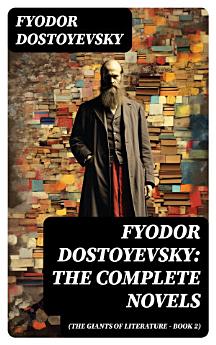Fyodor Dostoyevsky: The Complete Novels (The Giants of Literature - Book 2)
Nov 2023 · DigiCat
Ebook
5033
Pages
family_home
Eligible
info
reportRatings and reviews aren’t verified Learn More
About this ebook
Fyodor Dostoyevsky: The Complete Novels (The Giants of Literature - Book 2) is an essential compilation that captures the essence of Dostoyevsky's profound literary journey. Through this collection, readers are presented with a masterful blend of psychological depth, philosophical inquiry, and existential contemplation. The stylistic richness of his prose navigates the intricate landscapes of Russian society, ethics, and the human condition, illuminating the moral dilemmas faced by his complex characters. This anthology not only showcases famous works, such as *Crime and Punishment* and *The Brothers Karamazov*, but also sheds light on the societal transformations that shaped Dostoyevsky's narrative voice during a tumultuous era in Russian history. Fyodor Dostoyevsky, a towering figure in literature, draws upon his own tumultuous experiences, including his brushes with death, political exile, and profound spiritual crises, to create narratives that delve deep into the human psyche. His engagement with themes of faith, free will, and the nature of evil sets the groundwork for modern existential thought, making his novels an enduring source of intellectual inquiry and ethical exploration. This comprehensive collection is highly recommended for anyone seeking a profound understanding of human consciousness and moral complexity. Whether you are a seasoned literary scholar or a casual reader, this anthology invites you to lose yourself in the intricate narratives and explore timeless questions relevant to both personal and collective human experiences.
About the author
Fyodor Mikhailovich Dostoyevsky (1821-1881), a colossus of Russian literature, remains celebrated for his profound and penetrating insight into the human psyche. Rising to prominence with his early novel, 'Poor Folk' in 1846, Dostoyevsky quickly distinguished himself from his contemporaries with his distinct literary style, marked by deep psychological analysis, philosophical depth, and an unflinching examination of the most arduous facets of the human condition. His magnum opus, 'Crime and Punishment' (1866), navigates the troubled moral compass and existential dilemmas of its protagonist, Raskolnikov, while 'The Brothers Karamazov' (1880), Dostoyevsky's final novel, encapsulates his lifelong contemplation of faith, free will, and familial dynamics. Dostoyevsky's work transcends mere storytelling; his characters and narrative structures are a profound mosaic of social commentary and theological inquiry, deeply influencing existential philosophy and psychoanalysis. His other monumental works include 'The Idiot' (1869), which portrays the spiritual purity clashing with a society steeped in materialism and moral bankruptcy, and 'Demons' (1872), a prescient depiction of political radicalism. Compelled by personal experiences, including a near execution and years of penal servitude in Siberia, Dostoyevsky's creations often draw from the well of his own tribulations, forging a narrative path that seamlessly blends autobiographical elements with fiction. His literary achievements were recognized posthumously, as his full complexities were appreciated well into the 20th century, affording him an exalted position alongside literary giants.
Rate this ebook
Tell us what you think.
Reading information
Smartphones and tablets
Install the Google Play Books app for Android and iPad/iPhone. It syncs automatically with your account and allows you to read online or offline wherever you are.
Laptops and computers
You can listen to audiobooks purchased on Google Play using your computer's web browser.
eReaders and other devices
To read on e-ink devices like Kobo eReaders, you'll need to download a file and transfer it to your device. Follow the detailed Help Center instructions to transfer the files to supported eReaders.








